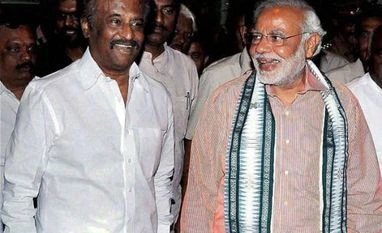After decades of speculation, Rajinikanth announced on New Year’s Eve that he was finally going to enter politics. Addressing thousands of fans in Chennai, the superstar — considered a demi-god or superhuman by many of his admirers — declared that he would form a political party and contest the state Assembly elections. About the 2019 Lok Sabha elections, he said he would take a call later. Rajini later told journalists: “I, too, want to create a political revolution. If there is a change now, future generations will live better.” Those speculating about whether Rajini’s political foray would be a dud, can take a break for now: A website launched by him on January 1 garnered millions of hits within hours and at least 300,000 registrations.
Rajini, of course, has been an influence to reckon with in Tamil politics since the mid-1990s. In 1996, he extended vocal support to the coalition of Dravida Munnetra Kazhagam (DMK) and Tamil Maanila Congress (TMC), helping them — according to some political pundits — win the Assembly elections. Notably, the TMC had used a bicycle as their political symbols and many of their posters had the iconic picture of Rajini on a cycle from his 1992 blockbuster Annamalai. His fans have only been too eager to see him enter the political arena and work his magic; some of them even started a political party in 2006, in a bid him take the plunge. Rajini had then desisted.
Of course, in south India, especially Tamil Nadu, cinema and politics have been twined since Independence. MGR, NTR, Jayalalithaa have all served as chief ministers and played a major part even in national politics. Rajini’s entry follows this tradition, where superstars and political leaders are given a larger-than-life status by their fans and supporters. While informing his fans about his intention to enter politics, Rajini reiterated the rhetoric of cleaning up the political landscape that is more than familiar to all of us now. “There is need for a political change,” he said. “In the name of democracy, political parties… are looting people.” Prime Minister Narendra Modi and Delhi Chief Minister Arvind Kejriwal, too, had promised similar clean-up acts before coming to power.
The character of the outsider has been a favourite of voters as of the audience. In fact, Rajini’s first commercial success in Billa (1980) — a remake of Amitabh Bachchan-starrer Don (1978) — paved the way for him to be cast as the “Angry Young Man”, which Big B had made famous in Hindi cinema. In 1981, Rajini would follow of the mafia don act of Billa by reprising Bachchan’s role in Deewar (1975) in its Tamil remake, Thee. At the height of his popularity in the South, Rajini made his Bollywood debut with Andha Kanoon (1983), starring Bachchan, Hema Malini and Reena Roy in lead roles. Incidentally, it was a remake of 1981 Tamil blockbuster Sattam Oru Iruttarai, which made a superstar out of Vijayakanth, who also served as the Leader of the Opposition in the Tamil Nadu Assembly from 2011 to 2016. (Someone needs to write a book on actors migrating north and south, into politics and out.)
In Andha Kanoon, Rajini’s character was called Vijay (till then monopolised by Bachchan). Traumatised by the murder of his father and the rape of his elder sister, Vijay is a malcontent seeking vengeance. His other sister Durga (Malini) also seeks justice and has become a police officer. Vijay, however, has no trust in the law: He considers it to be blind. (An allegorical play on the blindfolded Lady Justice statue frequently found in courtrooms of cinema.) How he tracks down his family’s tormentors — Amar, Akhbar and Anthony (would you believe it?) — is the supposed path of catharsis in the narrative.
The extrajudicial terror that Rajini’s character unleashes on the “villains” is a sort of reclaiming democracy and justice. Terry Eagleton, in Holy Terror, describes terrorism to be a modern invention, closely related to the modern democratic state. He tracks down the first use of the term to the French Revolution, where the state visits violence in its enemies. In more contemporary time, when the state or democratically elected political parties are perceived to be failing the electorate, the stage is set for an outsider to make their entry. This was the rhetoric of Donald Trump, of Modi, of Kejriwal — though, in essence, none is an outsider, none the vengeful malcontent denied justice and seeking vengeance.
In his 1995 film Muthu, Rajini’s hit dialogue was: “Naan eppa varuven, eppadi varuvennu yarukkum theriyadhu, aana varavendiya neratthil correct aga varuven (None knows when I would come, how I would come, but I will be there at the right time.)” After two decades, is this the right time then? One would suppose so. With the demise of Jayalalithaa — who dominated Tamil politics for the last decade — and the failure of DMK and AIADMK to find suitable successors, the political landscape in the state is set for a major churn. Like a true actor, he has made an opportune entry, but whether the Thalaivar can encash his fan base — some critics claim it could even propel him to New Delhi — and carve out a piece of the pie for himself remains to be seen.
Unlock 30+ premium stories daily hand-picked by our editors, across devices on browser and app.
Pick your 5 favourite companies, get a daily email with all news updates on them.
Full access to our intuitive epaper - clip, save, share articles from any device; newspaper archives from 2006.
Preferential invites to Business Standard events.
Curated newsletters on markets, personal finance, policy & politics, start-ups, technology, and more.
)